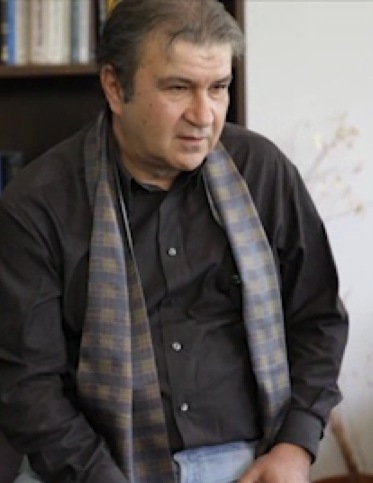KEYNOTE 1

Title: SPACE for Internet & INTERNET for Space
Vassilis Tsaoussidis
Professor at DUTH
Greece
Abstract: Space flight and Internet service are technologies that are currently complementary but seem to be on the verge of integration into a new ''space internetworking'' discipline. I will claim that a comprehensive realization of space internetworking technology should provide an infrastructure for universal interconnection among humans and their artifacts and could dramatically enhance space exploration, augment terrestrial industry and commerce, benefit the economically disadvantaged, and nurture human and civil rights. Part of the talk will be based on joint work with Scott Burleigh, Vint Cerf and Jon Crowcroft.
Short Bio: Vassilis Tsaoussidis, Professor, DUTH, was born in Greece, in November 1966. He holds degrees in Applied Mathematics and Computer Science (Ph.D 1995). Vassilis held faculty appointments at the Computer Science Department of SUNY Stony Brook, NY, US and at the college of Computer Science of Northeastern University, Boston, MA, US. Vassilis was also Visiting Professor at the MIT Dept. of Aeronautics and Astronautics. He is a board member of the Hellenic Space Agency. Vassilis coordinated several European projects such as FP-7 "Space Internetworking Center - SPICE", FP-7 Space-Data Routers, HORIZON 2020 UBOMILE. Vassilis was/is editor in several journals including IEEE Transactions on Mobile Computing, Computer Networks, Ad Hoc Networks. Part of his group’s work on DTN is included in NASA’s ION software. Vassilis has graduated 15 Ph.D students. His Ph.D. graduates have served as researchers or Professors in universities worldwide.
KEYNOTE 2

Title: Resource Management in Edge Computing: Opportunities and Open Issues
Albert Zomaya
Professor at University of Sydney
Australia
Abstract:
Recent technological trends such as Industry 4.0 introduced new challenges that push the limit of current computer and networking architectures. It demands the connection of thousands, if not millions, of sensors and mobile devices coupled with optimized operations to automate various operations inside factories. This led to the new era of Internet of Things (IoTs) where lightweight (possibly mobile) devices are envisaged to send vital information to cloud data centres (mobile and fixed infrastructure) for further processing and decision making.
Current cloud computing systems, however, are not able to efficiently digest and process collected information from IoT devices with strict response requests for two main reasons: (1) the round trip delay between IoT devices to the processing engines of cloud could exceed an application’s threshold, and (2) network links to cloud resources could be clogged when IoT devices flush data in an uncoordinated fashion. Fog and Edge Computing are two solutions to address both of the previous problems. Though designed to alleviate the same problem, they have fundamental differences that make adopting one more applicable than the other.
This talk will overview the practical concerns of exploiting Edge Computing to realize today’s IoT implementations through tackling the most important obstacles that hinder their adoption. First, production of applicable network (fixed and mobile) latency models to capture all elements of IoT platforms. Second, building a holistic Edge ecosystem to orchestrate various inter-related layers of IoT platforms, including connectivity, big-data analytics, and workload optimization. Third, proposing viable solutions that can be actually implemented in IoT-based applications. More details will be provided about the above issues during the talk.
Short Bio:
ALBERT Y. ZOMAYA is the Chair Professor of High Performance Computing and Networking and served as Australian Research Council Professorial Fellow (2010-2014) in the School of Information Technologies, Sydney University. He is also the Director of the Centre for Distributed and High Performance Computing which was established in late 2009.
Dr. Zomaya published more than 600 scientific papers and articles and is author, co-author or editor of more than 20 books. He served as the Editor in Chief of the IEEE Transactions on Computers (2011-2014) and was elected recently as a Founding Editor in Chief for the IEEE Transactions on Sustainable Computing. Also, Dr. Zomaya serves as a Co-Founding Editor-in-Chief of IET Cyber-Physical Systems and Associate Editor-in-Chief (Special Issues) of the Journal of Parallel and Distributed Computing. He also serves as an associate editor for 22 leading journals, such as, the ACM Computing Surveys, ACM Transactions on Internet Technology, IEEE Transactions on Cloud Computing, and IEEE Transactions on Computational Social Systems. Dr. Zomaya is the Founding Editor of several book series, such as, the Wiley Book Series on Parallel and Distributed Computing, Springer Scalable Computing and Communications, and IET Book Series on Big Data.
Dr. Zomaya has delivered more than 180 keynote addresses and invited seminars, and delivered many media briefings and has been actively involved, in a variety of capacities, in the organization of more than 700 conferences. Dr. Zomaya is the recipient of the IEEE Technical Committee on Parallel Processing Outstanding Service Award (2011), the IEEE Technical Committee on Scalable Computing Medal for Excellence in Scalable Computing (2011), the IEEE Computer Society Technical Achievement Award (2014), and the ACM SIGSIM MSWiM Reginald A. Fessenden Award (2017). He is a Chartered Engineer, a Fellow of AAAS, IEEE, IET, and a Distinguished Member of the ACM. Dr. Zomaya’s research interests are in the areas of parallel, distributed, and mobile computing, networking, and complex systems.